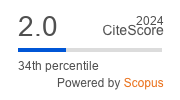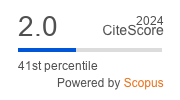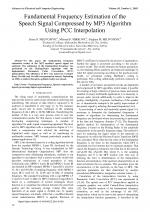| 1/2010 - 3 |
Fundamental Frequency Estimation of the Speech Signal Compressed by MP3 Algorithm Using PCC InterpolationMILIVOJEVIC, Z. N. |
| Extra paper information in |
| Click to see author's profile in |
| Download PDF |
Author keywords
fundamental frequency, speech compression, speech processing, signal representation
References keywords
frequency(18), signal(9), estimation(9), fundamental(8), speech(7), processing(6), process(5), milivojevic(5), interpolation(5), cubic(5)
Blue keywords are present in both the references section and the paper title.
About this article
Date of Publication: 2010-02-27
Volume 10, Issue 1, Year 2010, On page(s): 18 - 22
ISSN: 1582-7445, e-ISSN: 1844-7600
Digital Object Identifier: 10.4316/AECE.2010.01003
Web of Science Accession Number: 000275458900003
SCOPUS ID: 77954638982
Abstract
In this paper the fundamental frequency estimation results of the MP3 modeled speech signal are analyzed. The estimation of the fundamental frequency was performed by the Picking-Peaks algorithm with the implemented Parametric Cubic Convolution (PCC) interpolation. The efficiency of PCC was tested for Catmull-Rom, Greville and Greville two-parametric kernel. Depending on MSE, a window that gives optimal results was chosen. |
| References | | | Cited By |
Web of Science® Times Cited: 3 [View]
View record in Web of Science® [View]
View Related Records® [View]
Updated 2 weeks, 6 days ago
SCOPUS® Times Cited: 4
View record in SCOPUS® [Free preview]
View citations in SCOPUS® [Free preview]
[1] The Effects of the Acute Hypoxia to the Fundamental Frequency of the Speech Signal, MILIVOJEVIC, Z. N., MILIVOJEVIC, M., BRODIC, D., Advances in Electrical and Computer Engineering, ISSN 1582-7445, Issue 2, Volume 12, 2012.
Digital Object Identifier: 10.4316/aece.2012.02010 [CrossRef] [Full text]
Disclaimer: All information displayed above was retrieved by using remote connections to respective databases. For the best user experience, we update all data by using background processes, and use caches in order to reduce the load on the servers we retrieve the information from. As we have no control on the availability of the database servers and sometimes the Internet connectivity may be affected, we do not guarantee the information is correct or complete. For the most accurate data, please always consult the database sites directly. Some external links require authentication or an institutional subscription.
Web of Science® is a registered trademark of Clarivate Analytics, Scopus® is a registered trademark of Elsevier B.V., other product names, company names, brand names, trademarks and logos are the property of their respective owners.
Faculty of Electrical Engineering and Computer Science
Stefan cel Mare University of Suceava, Romania
All rights reserved: Advances in Electrical and Computer Engineering is a registered trademark of the Stefan cel Mare University of Suceava. No part of this publication may be reproduced, stored in a retrieval system, photocopied, recorded or archived, without the written permission from the Editor. When authors submit their papers for publication, they agree that the copyright for their article be transferred to the Faculty of Electrical Engineering and Computer Science, Stefan cel Mare University of Suceava, Romania, if and only if the articles are accepted for publication. The copyright covers the exclusive rights to reproduce and distribute the article, including reprints and translations.
Permission for other use: The copyright owner's consent does not extend to copying for general distribution, for promotion, for creating new works, or for resale. Specific written permission must be obtained from the Editor for such copying. Direct linking to files hosted on this website is strictly prohibited.
Disclaimer: Whilst every effort is made by the publishers and editorial board to see that no inaccurate or misleading data, opinions or statements appear in this journal, they wish to make it clear that all information and opinions formulated in the articles, as well as linguistic accuracy, are the sole responsibility of the author.



